The 48th International Viola Congress took place in Salaya, Thailand from June 6th – 10th, 2023. With a bit longer delay than usual, this daily blog report is delivered to you by Kristofer Skaug.
Day 3: Thursday, June 8th, 2023
<previous day> <next day>
The third day of the IVC in Salaya started off with a lecture doubleheader. The first lecture by Paul Groh discussed the Telemann Fantasias and their adaptation to the viola. Next up was Hillary Herndon and her students from the University of Tennessee, presenting a first printed anthology of works from the ground-breaking AVS Under-represented Composers Database. The album is called “Mosaic” and draws from the works of black and latino composers. A number of these pieces were performed.
Unfortunately I missed both of these morning lectures, which my better (rise-and-shiney) half told me were indeed very interesting. She even took a picture for me:
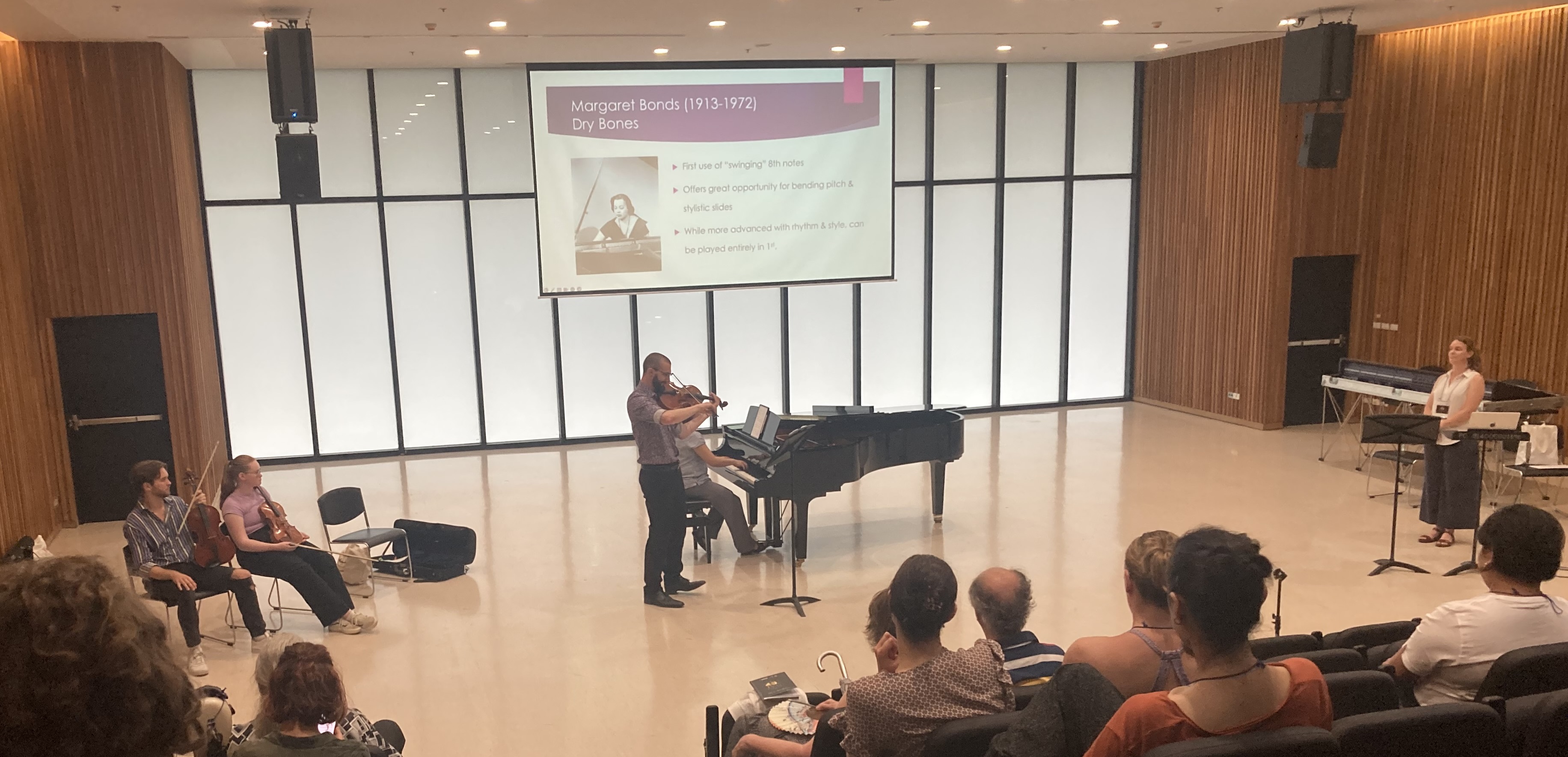 The first recital I did attend today was that of Jorge Alves, with a programme titled “Beautiful songs by 20th century Portuguese Composers“, The works were by Joly Braga Santos, Armando José Fernandes and a sonatine by Luiz Costa. Especially this sonatine spoke to me, indeed beautiful (as advertised), without any overly modernistic pretentions. I admire Jorge for his persistent drive to bring us this music from his homeland, and my guess is that we stlll have much to look forward to from him.
The first recital I did attend today was that of Jorge Alves, with a programme titled “Beautiful songs by 20th century Portuguese Composers“, The works were by Joly Braga Santos, Armando José Fernandes and a sonatine by Luiz Costa. Especially this sonatine spoke to me, indeed beautiful (as advertised), without any overly modernistic pretentions. I admire Jorge for his persistent drive to bring us this music from his homeland, and my guess is that we stlll have much to look forward to from him.
 Now the stage was set for special guest artist Krit Supabpanich in the MACM auditorium. Supabpanich is a “home grown” former student of the Mahidol Univ. College of Music and currently is a member of the Thailand Philharmonic. The program consisted predominantly of new (premiere) music by Thai composers, several of which were present at the concert. We’re all ears!
Now the stage was set for special guest artist Krit Supabpanich in the MACM auditorium. Supabpanich is a “home grown” former student of the Mahidol Univ. College of Music and currently is a member of the Thailand Philharmonic. The program consisted predominantly of new (premiere) music by Thai composers, several of which were present at the concert. We’re all ears!
He starts off with a solo piece called “Student’s Parade” (by Cherng-Woei Tai), no doubt meant as a nod to his past at this school. It has a certain idiomatic and agreeable motion and harmony, which however soon was to be outshone by the ensuing viola/cello duet called “Perpetual Transience” (composed by Chanathip Chaisirinon) – which had a captivating effect on me.
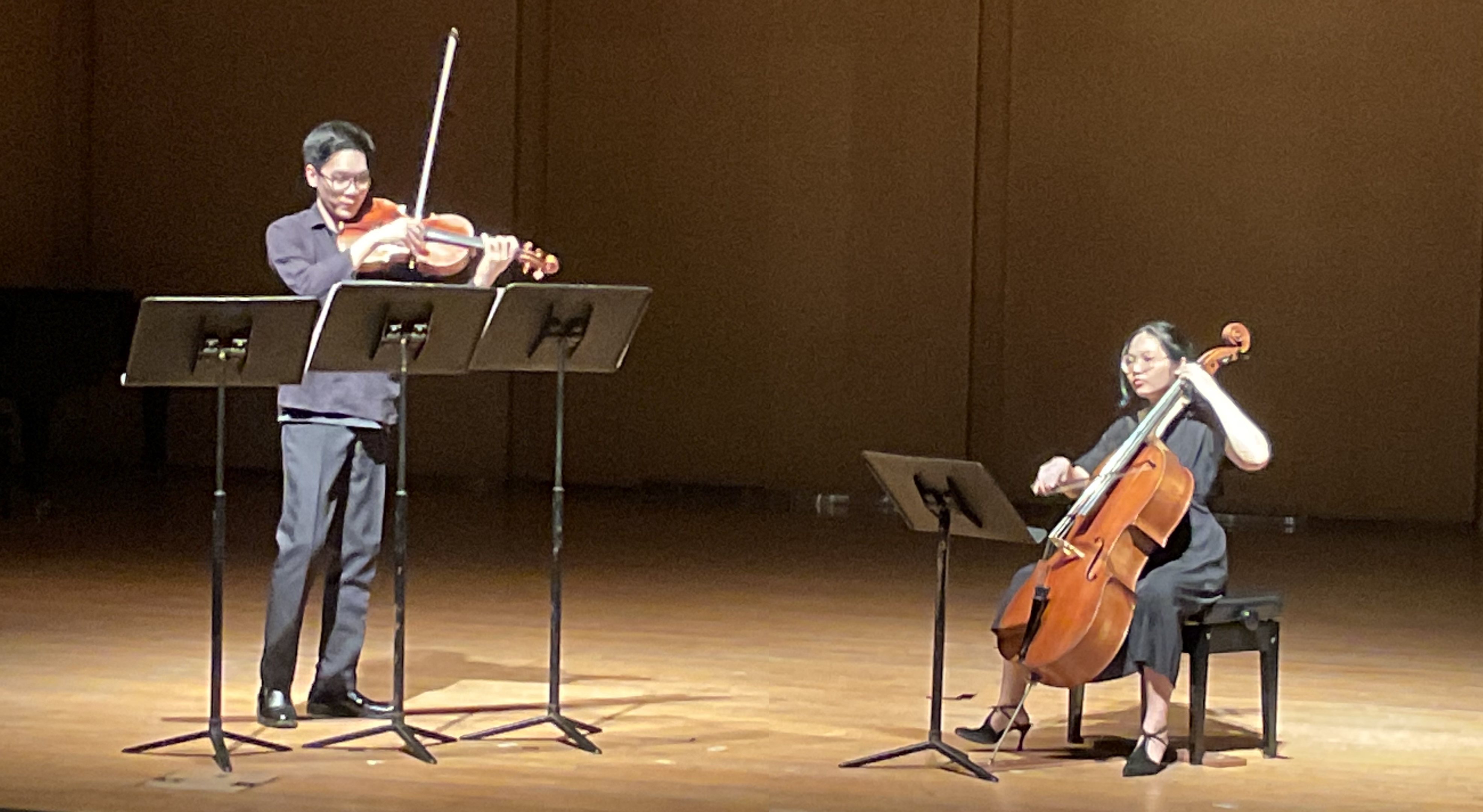 After this came a bit of a letdown, Study nr.2 for solo viola (composed by Rattana Suparatanachatpan) leaned heavily on Extended Techniques but seemed more a showcase of how to produce weird sounds with your viola, rather than a truly artistic expression. The Lazzi for solo viola (by Jirapat Leetrakulnumchai) maneuvred us back to the conceptual world of the initial Parade piece, which I feel more at ease with.
After this came a bit of a letdown, Study nr.2 for solo viola (composed by Rattana Suparatanachatpan) leaned heavily on Extended Techniques but seemed more a showcase of how to produce weird sounds with your viola, rather than a truly artistic expression. The Lazzi for solo viola (by Jirapat Leetrakulnumchai) maneuvred us back to the conceptual world of the initial Parade piece, which I feel more at ease with.
Last but certainly not least, Tanaphan Polrob had been commissioned to write a Sonata for viola and Guzheng (a kind of Chinese cither that is used also in Thai traditional music). The sonata carries the title “Perpetuum mobile“, however I couldn’t quite match this title with the music – but the Guzheng player assured me that the requisite looping patterns were present, I guess I need some training to digest this quite complex and interesting new soundscape. What in particular appealed to me was the direct musicianship in the interplay and sound confluence of the viola and this guzheng. All in all, Supabpanich and his team of composers and co-performers (pictured below) deserve many kudos for launching this gutsy program of Thai contemporary music onto the world stage.
 Although the next recital artist was already waiting in the wings, at this point I had to leave the MACM auditorium for a number of reasons:
Although the next recital artist was already waiting in the wings, at this point I had to leave the MACM auditorium for a number of reasons:
1) realizing it was 14.00h and the College canteen closes around this time;
2) avoiding “cold fusing” my lower back to the auditorium seat
3) knowing there was no other possible break in sight until after the evening concert
When I returned from lunch, it was to hear Vinciane Béranger and her teammates Tiphaine Lucas (cello) and Joachim Besse (piano) in a charming programme inspired by Rebecca Clarke’s “Irish Melody” (new arr. for viola/cello). We might have known that the tune “Danny boy” (with an appreciative wave to our Congress Host) would turn up here, sooner or later, and it did :-). However, the actual programme was modified significantly compared to the printed one (where the pieces with piano were not even mentioned), I had planned to ask what was actually played (it was certainly not Bartók and Lutoslawski) – anyhow it was very enjoyable.
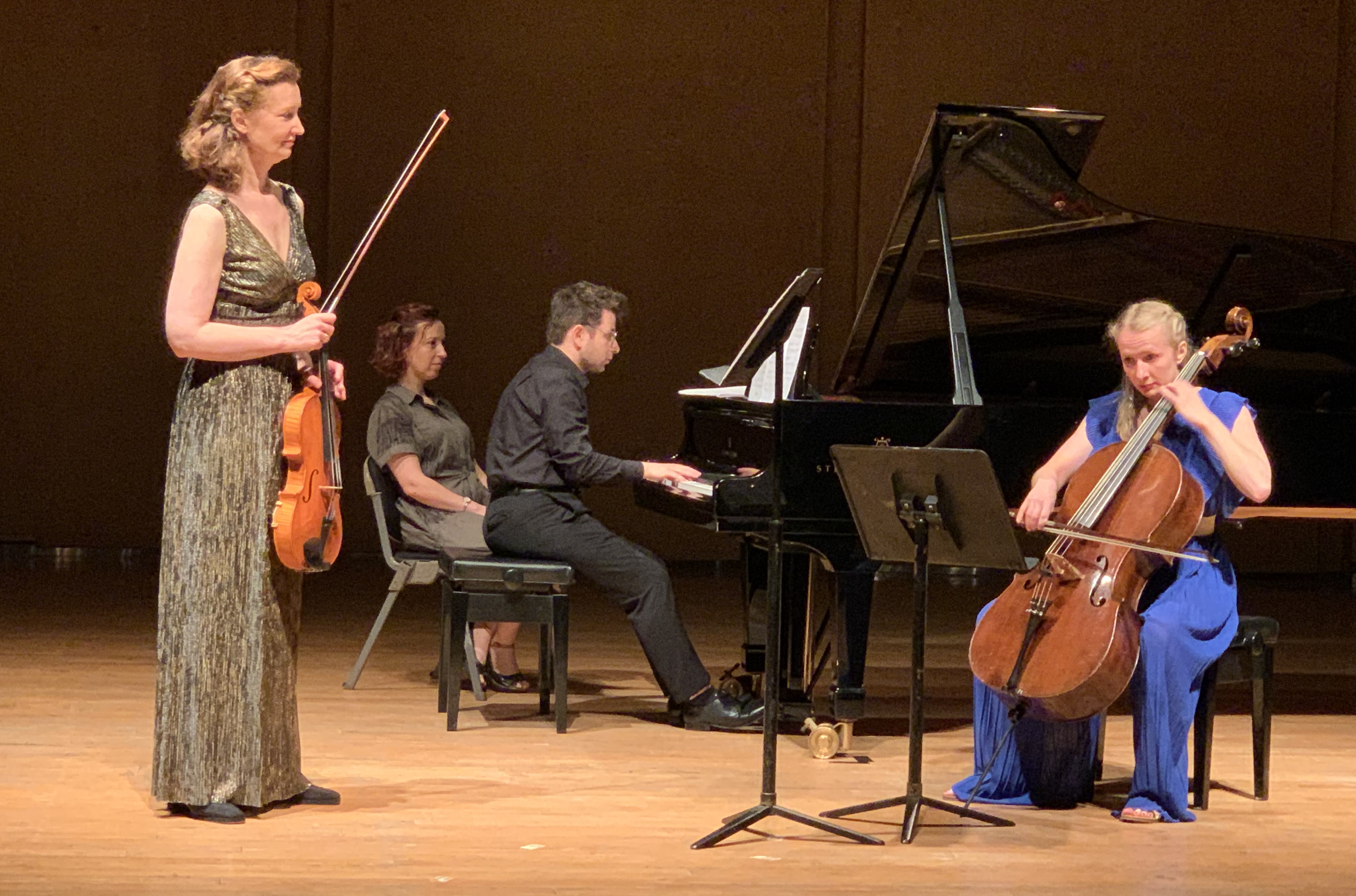 Time for this year’s congress contribution of the young Norwegian Viola Society, brought to us by mr. Povilas Syrrist-Gelgota. This charismatic Lithuanian-born violist has abandoned the financial security of his Oslo Philharmonic seat to enjoy the freedom of off-road viola playing. And he knows how to use this freedom, mixing folk songs, his own improvisations and compositions, and his quite steady vocal chords to create a very intriguing set.
Time for this year’s congress contribution of the young Norwegian Viola Society, brought to us by mr. Povilas Syrrist-Gelgota. This charismatic Lithuanian-born violist has abandoned the financial security of his Oslo Philharmonic seat to enjoy the freedom of off-road viola playing. And he knows how to use this freedom, mixing folk songs, his own improvisations and compositions, and his quite steady vocal chords to create a very intriguing set.
A memorable part was the composition “Song of the Mountain People” by Vidar Kristensen, while Norwegian music, it is inspired by Taiwanese folk songs and brought to you by a Lithuanian violist at this congress in Thailand. “Music without borders” (this year’s congress theme), indeed! More singing in “Ingen vinner frem” and two own compositions by Povilas called “Dream” and “Best Wishes”. The congress audience was very appreciative of this performance.
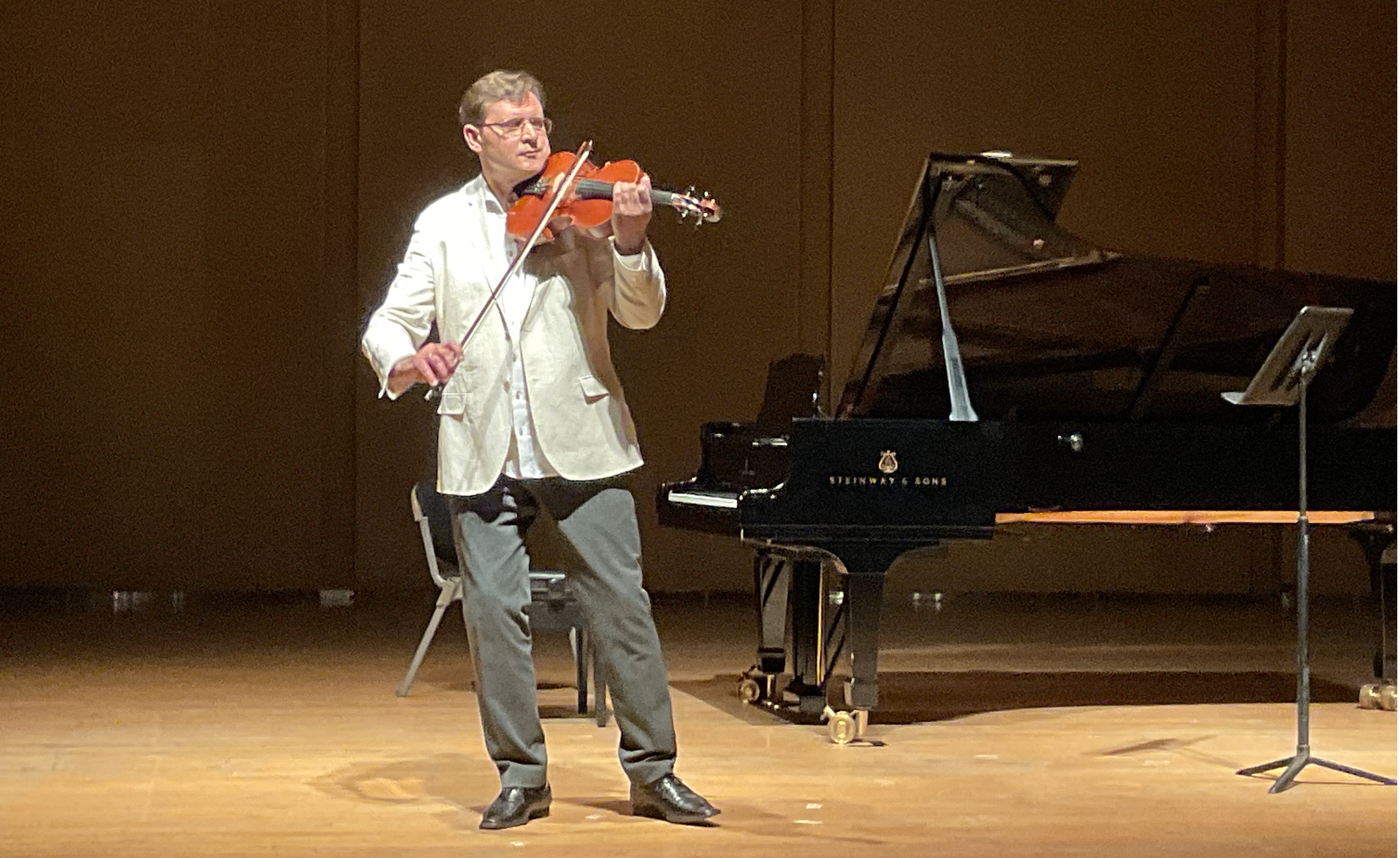 Enter Jerzy Kosmala. This respected US-based Polish violist and teacher has passed the age where you just don’t ask anymore, but is still on his feet and performing. We vividly recall his performing Wranitzky’s double concerto with his own grandson at the congress in Poznan (2019). This time he brought us a hearty menu consisting of Bruch’s Kol Nidrei, Bloch’s Suite Hebraïque and the entire César Franck Sonata.
Enter Jerzy Kosmala. This respected US-based Polish violist and teacher has passed the age where you just don’t ask anymore, but is still on his feet and performing. We vividly recall his performing Wranitzky’s double concerto with his own grandson at the congress in Poznan (2019). This time he brought us a hearty menu consisting of Bruch’s Kol Nidrei, Bloch’s Suite Hebraïque and the entire César Franck Sonata.
 Did I mention it was a rather busy congress program this afternoon/evening? Since 11am this morning there have been 7 straight recitals so far, it is now 5 pm, and we still have 4 performances to go.
Did I mention it was a rather busy congress program this afternoon/evening? Since 11am this morning there have been 7 straight recitals so far, it is now 5 pm, and we still have 4 performances to go.
The next one was truly a whopper: All of Hindemith’s (four) solo sonatas in one go, performed by the American violist Amadi Azikiwe. He had chosen the following playing order (by opus number): 25/1, 31/4, “1937” and 11/5.
The sonatas were all well played, but are not particularly suited for such a marathon (or should we say “Hindemithon”), in my view. The well known opening sonata 25/1 sounded as if one was saving energy for all the other sonatas to come. But each of these pieces deserve undivided and unreserved polishing devotion in order for the Hindemith spirit to pop out of the lamp. Also in the technically gruelling opening movement of 31/4, Saint Hindemith’s bald head did not emerge from behind the clouds. Peace and balance finally came in the 2nd movement.
 But Azikiwe was only just getting warmed up, and halfway through the programme, he seemed to have found the groove. His convincing rendition of the “1937” sonata, infamous for its technical demands, drew spontaneous cheers from the audience. Really well done! (afterward, at the dinner table in Ristorante Rustico, he told me this is also his favourite of the four sonatas … we could tell.).
But Azikiwe was only just getting warmed up, and halfway through the programme, he seemed to have found the groove. His convincing rendition of the “1937” sonata, infamous for its technical demands, drew spontaneous cheers from the audience. Really well done! (afterward, at the dinner table in Ristorante Rustico, he told me this is also his favourite of the four sonatas … we could tell.).
Now for the final 11/5 sonata however, I had a problem, which was all on my side. I love Hindemith just as much as the next violist (maybe even more!), but my ears and brain need a break. My grandpa used to say, “I can never get too much beer, but my arms grow tired”. So the bottom line is still that I prefer Hindemith’s solo sonatas in moderate digestible amounts.
A big tip of the hat to Azikiwe nonetheless for braving this monster challenge. And certainly he had a most appreciative and knowledgeable Viola audience, unlike any you’d find in the average recital hall.
Some lighter material awaited us in the programme “Musical Hors d’Oeuvres for viola and violin from around the world“, performed by IVS President Jutta Puchhammer-Sédillot and Viola Congress regular “house violinist” Annette-Barbara Vogel. Departing from Jutta’s native Austria (Vienna), a Robert Fuchs op. 60 duo gave the upbeat to a “world tour” of duos taking us through France (Charles Koechlin), Russia (Arthur Lourié and Reinhold Glière – composers for which today surely Belarus and Ukraine, respectively, would claim credit), Canada (both Jutta’s and Annette-Barbara’s current residence) and finally England (Gordon Jacob).
 A few notes – the Glière duos are of course originally for violin and cello. It was not clear whether Jutta was reading the bass clef or whether someone had touched up her part with a viola clef. Would be nice to know! Secondly, the duo “Three for Pi” by Canadian composer Paul Frehner was in fact commissioned for this congress. If there was a voiced effort to explain this title, I must have missed it (I admit I was a bit tired at this point), I am speculating now on mathematical / symbolic meanings or possible word plays. I’ll add the explanation here if/when I find it!
A few notes – the Glière duos are of course originally for violin and cello. It was not clear whether Jutta was reading the bass clef or whether someone had touched up her part with a viola clef. Would be nice to know! Secondly, the duo “Three for Pi” by Canadian composer Paul Frehner was in fact commissioned for this congress. If there was a voiced effort to explain this title, I must have missed it (I admit I was a bit tired at this point), I am speculating now on mathematical / symbolic meanings or possible word plays. I’ll add the explanation here if/when I find it!
The next recital by Juliet White-Smith (titled “Origins: Pre-21st Century Viola Works from the African Diaspora“) brought a couple of surprises. There were two pleasant shorter violin/piano transcriptions, Night and Elfentanz by Florence Price (1887-1953). But the core elements of White-Smith’s recital were two original viola works by the Afro-American composer Ulysses Kay (1917-1995) :A single-movement Sonatina, followed by a four-part Sonata, the latter written under audible mentorship of Paul Hindemith himself. Thank you to mrs. White-Smith for her research that has resurfaced this music, which certainly should be able to hold its own in our repertoire.
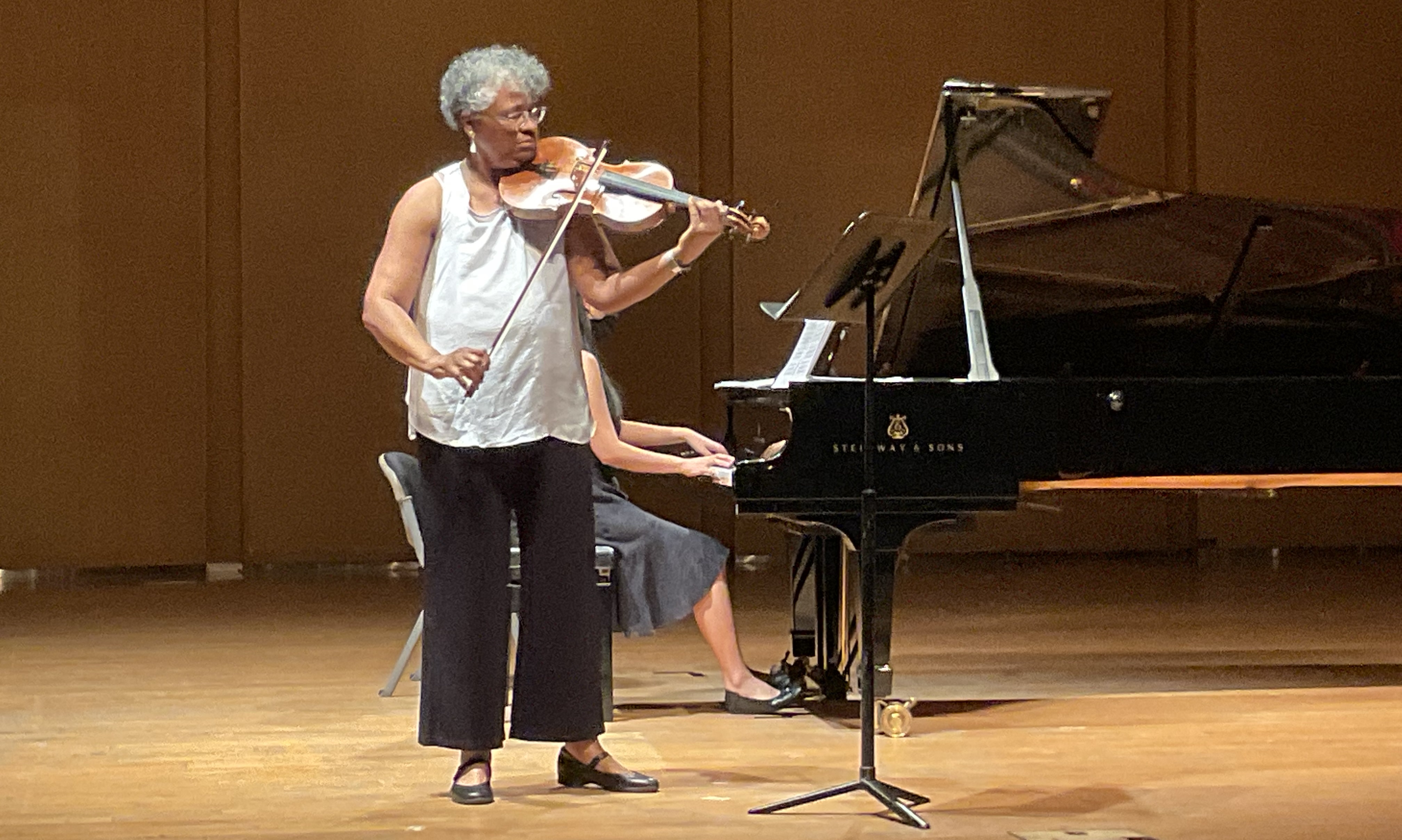 This evening’s special “Featured Artist” concert was given by the TAIORO ensemble from New Zealand, featuring viola great and former IVC Congress Host Donald Maurice, together with “spoken work poet” Sharn Maree and pianist Sherry Grant. We heard poems interleaved and sometimes supported by viola/piano works by Alfred Hill, Douglas Lilburn and Sharn Maree herself. The poetry springs from the indigenous Māori culture and reflects on sometimes painful confrontations with social inequality and change.
This evening’s special “Featured Artist” concert was given by the TAIORO ensemble from New Zealand, featuring viola great and former IVC Congress Host Donald Maurice, together with “spoken work poet” Sharn Maree and pianist Sherry Grant. We heard poems interleaved and sometimes supported by viola/piano works by Alfred Hill, Douglas Lilburn and Sharn Maree herself. The poetry springs from the indigenous Māori culture and reflects on sometimes painful confrontations with social inequality and change.
 This evening’s “afterparty” in Ristorante Rustico drew a lot of hungry and thirsty people after a very intensive congress day! At some point, “someone” from the Polish delegation started pouring drinks that definitely were not apple juice. A Good Time ™ was had by all.
This evening’s “afterparty” in Ristorante Rustico drew a lot of hungry and thirsty people after a very intensive congress day! At some point, “someone” from the Polish delegation started pouring drinks that definitely were not apple juice. A Good Time ™ was had by all.
Kristofer
<previous day> <next day>

